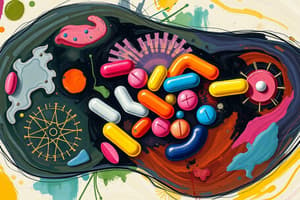Podcast
Questions and Answers
What is the primary mechanism of action of HMG-CoA reductase inhibitors?
What is the primary mechanism of action of HMG-CoA reductase inhibitors?
- Inhibits enzyme responsible for cholesterol synthesis (correct)
- Inhibits bile acid synthesis
- Reduces absorption of dietary cholesterol
- Increases insulin sensitivity
Which of the following is a major adverse effect associated with statins?
Which of the following is a major adverse effect associated with statins?
- Fatigue
- Gastrointestinal bleeding
- Myopathy (correct)
- Platelet dysfunction
Which condition is contraindicated for the use of statins?
Which condition is contraindicated for the use of statins?
- Hypertension
- Pregnancy (correct)
- Diabetes
- Hyperglycemia
What is a key nursing implication for administering statins?
What is a key nursing implication for administering statins?
Which of the following drugs is known to increase the risk of statin side effects?
Which of the following drugs is known to increase the risk of statin side effects?
What physiological changes can statins cause besides lowering LDL cholesterol?
What physiological changes can statins cause besides lowering LDL cholesterol?
What serious condition can result from the use of statins, particularly at high doses?
What serious condition can result from the use of statins, particularly at high doses?
Which aspect is NOT a reason for using statins in treatment?
Which aspect is NOT a reason for using statins in treatment?
Which of the following is considered a benefit of statins in patients?
Which of the following is considered a benefit of statins in patients?
Statins are mainly indicated in patients with which condition?
Statins are mainly indicated in patients with which condition?
What is the primary mechanism of action for fibric acid derivatives like fenofibrate?
What is the primary mechanism of action for fibric acid derivatives like fenofibrate?
Which of the following is NOT a contraindication for the use of ezetimibe?
Which of the following is NOT a contraindication for the use of ezetimibe?
What adverse effect is most commonly associated with bile acid sequestrants such as cholestyramine?
What adverse effect is most commonly associated with bile acid sequestrants such as cholestyramine?
Why should patients on fibrates like fenofibrate be monitored for bleeding?
Why should patients on fibrates like fenofibrate be monitored for bleeding?
What is a significant nursing implication for administering PCSK9 inhibitors like alirocumab?
What is a significant nursing implication for administering PCSK9 inhibitors like alirocumab?
Which adverse effect might a nurse be concerned about in patients receiving fenofibrate for lowering triglycerides?
Which adverse effect might a nurse be concerned about in patients receiving fenofibrate for lowering triglycerides?
How do bile acid sequestrants like cholestyramine primarily lower LDL cholesterol levels?
How do bile acid sequestrants like cholestyramine primarily lower LDL cholesterol levels?
Which drug class does not directly affect cholesterol absorption or production but rather focuses on recycling receptors?
Which drug class does not directly affect cholesterol absorption or production but rather focuses on recycling receptors?
What nutritional consideration must be taken if patients are on bile acid sequestrants?
What nutritional consideration must be taken if patients are on bile acid sequestrants?
Which medication is primarily indicated for serum triglyceride levels greater than 500 mg/dL?
Which medication is primarily indicated for serum triglyceride levels greater than 500 mg/dL?
Study Notes
HMG- CoA REDUCTASE INHIBITORS “STATINS”
- Prototype: Atorvastatin
- Primarily responsible for hepatic synthesis of cholesterol
- Key use: Hypercholesterolemia
- Key use (secondary): Reduce risk of Cardiovascular Events (CV events)
- Main Adverse Effects: Myopathy, muscle pain/weakness, rhabdomyolysis
- Contraindications: Pregnancy category X, medications that increase the risk of statin side effects (azoles, macrolides, fibrates)
- Nursing Implications: Monitor for statin side effects (especially dark cola-colored urine), monitor liver function, counsel about appropriate dosage, potential interactions with other medications, avoid grapefruit juice, and educate patients about the potential effect on blood glucose.
BILE ACID SEQUESTRANTS
- Prototype: Cholestyramine
- Mechanism: Binds to bile acids in the gut, causing them to be excreted in feces. This leads to liver using excess cholesterol to make new bile acids.
- Key Use: Decreases LDL cholesterol
- Main Adverse Effects: Gastrointestinal (GI) concerns: nausea, vomiting, diarrhea
- Contraindications: Decreases efficacy of some oral medications and statins.
- Nursing Implications: Monitor for GI side effects, inform patient about effects on medications, monitor levels of Vitamins A, D, E, K, and supplement if necessary
FIBRIC ACID DERIVATIVES (FIBRATES)
- Prototype: Fenofibrate
- Mechanism: Decreases hepatic production of triglycerides, decreases VLDL cholesterol, and increases HDL.
- Key Use: Most effective at lowering serum triglycerides, ideally when triglycerides are > 500 mg/dL.
- Main Adverse Effects: Severe renal impairment or liver disease, can worsen bleeding from anticoagulants.
- Contraindications: Severe renal impairment or liver disease, use with caution with anticoagulants.
- Nursing Implications: Avoid use in patients with severe renal or liver disease, monitor for bleeding in patients taking anticoagulants, counsel patients on appropriate dosage.
CHOLESTEROL ABSORPTION INHIBITOR
- Prototype: Ezetimibe
- Mechanism: Blocks biliary and dietary cholesterol absorption
- Key Use: Dyslipidemia (monotherapy or combination with statin)
- Main Adverse Effects: Pregnancy and Lactation (not recommended)
- Contraindications: Severe hepatic impairment
- Nursing Implications: Counsel regarding possible effects on pregnancy and lactation, monitor liver function, administer with meals.
PCSK9 INHIBITORS
- Prototype: Alirocumab
- Mechanism: Increases activity of receptors that clear cholesterol
- Key Use: Adults with ASCVD or familial hypercholesterolemia.
- Main Adverse Effect: None to note
- Contraindications: None to note.
- Nursing Implications: Administered by subcutaneous (subQ) injection, may be very expensive.
MISC.
- These categories are not exhaustive in addressing all lipid-lowering medications. All medications have potential adverse effects and contraindications.
- Individualized assessment is crucial for determining the most appropriate treatment for individual patients.
- There are many other lipid lowering medications available, including combination therapies.
- Always consult with a healthcare professional to discuss the risks and benefits of medication before taking any medication.
Studying That Suits You
Use AI to generate personalized quizzes and flashcards to suit your learning preferences.
Related Documents
Description
This quiz focuses on the pharmacology of statins, specifically Atorvastatin, and bile acid sequestrants like Cholestyramine. It covers key uses, mechanisms, adverse effects, contraindications, and nursing implications relevant to these medications. Test your knowledge on lipid-lowering agents and their clinical relevance.


